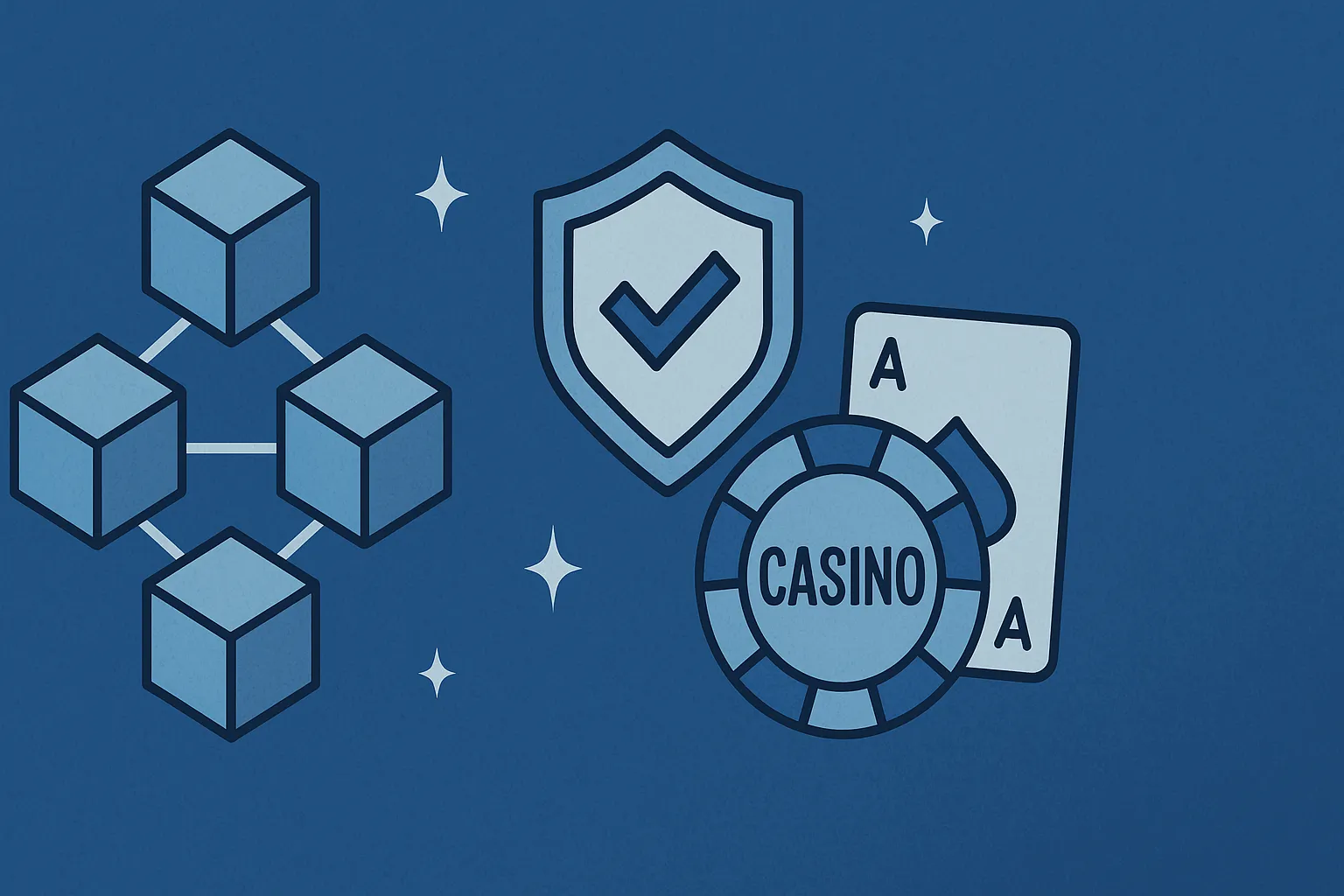More people are gambling online in 2025, but trust is still the biggest concern. With real money on the line, you need more than good vibes from a casino. You need proof the games are fair. That’s where blockchain comes in. It gives you tools to verify results, track bets, and confirm that nothing has been rigged behind the scenes. You don’t have to guess or rely on luck alone. In this guide, we’ll show you how to spot fairness, check smart contracts, and protect your bankroll every time you play.
Understanding Casino Fairness
What is Blockchain Technology?
Blockchain is more than just a buzzword. It gives players real control and visibility. Instead of relying on a casino to handle everything behind the scenes, blockchain records each transaction and game result in a way that is permanent, tamper-proof, and open to the public.
Casinos typically use two kinds of blockchain systems:
- Public blockchains allow anyone to verify outcomes and track all activity.
- Private blockchains are managed by the casino or a selected group.
Most trusted platforms use public chains along with smart contracts, which run game rules automatically and remove the need for middlemen.
How Blockchain Ensures Fair Play in 2025
In 2025, blockchain technology plays a pivotal role in transforming online gambling into a more transparent and accountable industry. By enabling provably fair algorithms, automating payouts through smart contracts, and recording all game activity on a public ledger, blockchain ensures that players can trust the integrity of every bet. This technology removes the need for blind trust in casino operators by making fairness independently verifiable.

Provably Fair Algorithms
Provably fair gaming allows players to verify each game result. It typically works using a combination of player and server seeds (strings of random numbers). Before each game, a cryptographic hash of the server seed is shown to the player. After the game, the player can use the server seed, their own input, and the hash to verify that the outcome was not altered.
Smart Contracts for Automated Payouts
Winnings are processed automatically through smart contracts. This eliminates the need for manual payouts and prevents delays or manipulation. Since these contracts are published on the blockchain, anyone can inspect the rules and logic behind them.
Immutable Game Records
Every game result, bet, and transaction is recorded on-chain. This provides an open trail that players or third parties can review to ensure fairness and compliance with published odds.
Verifying Fairness as a Player
You don’t need to be a developer or blockchain pro to confirm that a Bitcoin casino is being honest. In fact, many tools in 2025 make it easy for everyday players to check fairness on their own. Here’s how to do it:
- → Check for public blockchain use: Casinos that use Ethereum, Solana, or Polygon allow anyone to view game data and verify outcomes in real time.
- → Verify the smart contract address: A legit casino will share the address for its smart contracts. Use explorers like Etherscan to confirm it’s active and matches the rules of the game.
- → Look for provably fair mechanics: Before playing, the casino should show a hashed server seed. After the game, both the player and server seeds should be available so you can confirm that the result wasn’t tampered with.
- → Use built-in verification tools: Many casinos have on-site features that walk you through the fairness check. Others link to outside tools that handle the process.
- → Look for published code or audits: The most transparent casinos share their smart contract code on GitHub and show audit reports from trusted cybersecurity firms.
Red Flags to Watch For
Some platforms market themselves as blockchain casinos but don’t offer the transparency that comes with it. The appearance of fairness is not the same as actual accountability. Here’s what to watch out for:
| Red Flag | What It Actually Means | Why You Should Be Concerned |
|---|---|---|
| Missing player input or seed | The game doesn’t use your own random seed during play | You can’t verify that outcomes were truly random, opening the door to manipulation |
| No smart contract or on-chain record | The platform doesn’t link to any blockchain-based code or result history | You’re unable to inspect how games function or confirm results weren’t altered |
| No audits or transparency reports | There’s no independent code review or public documentation | You have to trust the casino blindly without proof the system is secure or fair |
| Claims decentralization but isn’t | The casino uses blockchain branding, but most operations stay off the blockchain | Game logic and funds may be handled privately, defeating the purpose of decentralization |
Top Blockchain Casinos in 2025
In 2025, a handful of blockchain-based casinos have distinguished themselves by providing provably fair gaming, transparent operations, and strong community trust. These platforms set the standard for integrity in the online gambling space by using public blockchains, publishing their code, and embracing external audits. Here are a few of the most trusted names in the industry:
BC.Game
BC.Game is a pioneer in fully decentralized gaming. It operates on multiple blockchains, including Ethereum and BNB Chain, and allows players to verify each game result using provably fair algorithms. The platform publishes all smart contract addresses and provides detailed instructions for checking game outcomes. Its open-source nature and commitment to fairness have made it one of the most respected platforms among crypto gambling enthusiasts.
Stake
Stake.com is a hybrid platform that blends traditional casino features with blockchain-based fairness mechanisms. While not entirely decentralized, it offers provably fair games where users can generate and verify seeds. Stake also provides transparent payout information and maintains a consistent track record of fair play, which has earned it endorsements from high-profile figures and strong loyalty from its user base.
Rollbit
Rollbit has gained recognition for embracing on-chain betting and storing all gaming results on public blockchains. Players can track every bet and game result through blockchain explorers like Etherscan. Rollbit is also known for offering innovative features such as NFT gambling and tokenized vip rewards. Its clear focus on transparency and accountability has made it a favorite among more tech-savvy players.
Tools and Platforms for Fairness Verification
Thanks to blockchain technology, players now have real ways to check if casino games are actually fair. You don’t need coding experience or technical skills. Many tools are easy to use, even for beginners. Below is a breakdown of the most useful platforms and what each one can do.
| 🧩 Tool Type | 🔧 Examples | 🎯 What It Does |
|---|---|---|
| 🧭 Blockchain Explorers | Etherscan, Solana Explorer, PolygonScan | Lets you view smart contracts, verify transaction history, track bets, and check wallet activity. Paste the casino’s contract address to see on-chain data in real time. |
| 🔒 Provably Fair Tools (Built-In) | Found in BC.Game, Stake, Roobet | These tools let you input seeds and compare hashes to verify results. They usually include step-by-step instructions for validating fairness. |
| 🧠 Browser Extensions & dApps | Provably Fair Inspector, MetaMask with contract tracking, FairnessChecker.io | Run independent checks on game logic, verify odds, or compare declared rules with actual outcomes. Very useful across multiple platforms. |
| 📁 Audits & Code Repositories | GitHub (DAO.Casino, FunFair), audit reports from CertiK, SlowMist, Quantstamp | For advanced users. These let you inspect source code or review third-party audits that check for bugs, backdoors, or dishonest logic. |
Conclusion
In 2025, blockchain has changed the way fairness works in online casinos. Players now have real tools to check game results, confirm payout rules, and see that everything runs as it should. You no longer have to rely on blind trust. With blockchain, you can verify what’s happening behind the scenes. This shift gives players more control and helps build trust in a space that has often lacked it. If you are going to play, take a moment to verify. It’s your money, and you deserve a system that plays fair.


